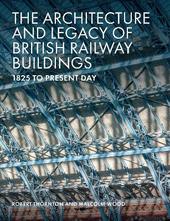
|
The Architecture and Legacy of British Railway Buildings: 1825 to present day
Hardback
Main Details
| Title |
The Architecture and Legacy of British Railway Buildings: 1825 to present day
|
| Authors and Contributors |
By (author) Robert Thornton
|
|
By (author) Malcolm Wood
|
| Physical Properties |
| Format:Hardback | | Pages:160 | | Dimensions(mm): Height 246,Width 189 |
|
| Category/Genre | Public buildings - civic, commercial, industrial, etc
Trains and railways |
|---|
| ISBN/Barcode |
9781785007118
|
| Classifications | Dewey:385.31 |
|---|
| Audience | |
|---|
| Illustrations |
164 colour and 5 b&w photographs and 25 colour and 8 b&w drawings
|
|
Publishing Details |
| Publisher |
The Crowood Press Ltd
|
| Imprint |
The Crowood Press Ltd
|
| Publication Date |
2 March 2020 |
| Publication Country |
United Kingdom
|
Description
Railway buildings have always had a fascinating character all of their own, despite many no longer being in operational railway service. This book tells the story of how these buildings evolved alongside the development of the railway in Great Britain and examines how architects over the years have responded to the operational, social and cultural influences that define their work. Written for those with a keen interest in architecture and the railway, as well as those new to the subject, The Architecture and Legacy of British Railway Buildings provides an unique insight into the production of railway architecture, both in the context of railway management and the significant periods of ownership, and the swings in national mood for railway-based transportation. As well as tracing its history, the authors take time to consider the legacy these buildings have left behind and the impact of heritage on a continually forward-looking industry. Topics covered include: the context of railway architecture today; the history of how it came into existence; the evolution of different railway building types; the unique aspects of railway building design, and finally, the key railway development periods and their architectural influences. AUTHOR: Robert Thornton and Malcolm Wood commenced their careers as architects at the Regional Architect's Office for the Western Region of British Rail in the 1970s, before contributing several decades' worth of architectural expertise to the railway architecture industry. They went on to be Principal Architect for Network Rail and Company Secretary to the Railway Heritage Trust, respectively. Their shared experience of designing for the railway environment, understanding the value of practical conservation and recognising the unique power of railway buildings in regeneration, has led both to the appointed to the Railway Heritage Trust's Advisory Panel and both are judges for the National Railway Heritage Awards. 164 colour and 5 b/w photographs, 25 colour and 8 b/w drawings
Author Biography
Robert Thornton and Malcolm Wood commenced their careers as architects at the Regional Architect's Office for the Western Region of British Rail in the 1970s, before contributing several decades' worth of architectural expertise to the railway architecture industry. They went on to be Principal Architect for Network Rail and Company Secretary to the Railway Heritage Trust, respectively. Their shared experience of designing for the railway environment, understanding the value of practical conservation and recognizing the unique power of railway buildings in regeneration, has led both to the appointed to the Railway Heritage Trust's Advisory Panel and both are judges for the National Railway Heritage Awards.
ReviewsThe book is an attractive and well-produced volume comprising 192 pages of text plus acknowledgements, contents list, index and bibliography. For the price this is a good book and specifically for SPAB members highlights many schemes where railway buildings have found new uses outside of the operational railways. -- Clive Baker * SPAB magazine - The Society for the Protection of Ancient Buildings * Most railway architecture has had to adapt to its predecessor. This fascinating book shows how skilfully that can be done. It also points to a future where Crossrail, HS2 and other projects will deliver an entirely new architectural legacy. Britain's great railway journey is far from over. -- Nigel Crowe, Institute of Historic Building Conservation * Institute of Historic Building Conservation *
|